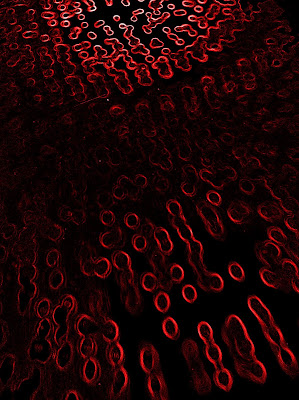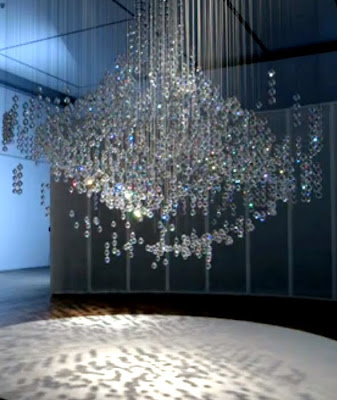Fig. 1. Shadows below the Fredrikson-Stallard installation 'Pandora' with additional Neon EFX
Fredrikson Stallard piece for the Digital Memory Gallery sponsored by Swarovski called 'Pandora' is a collaboration between Patrik Fredrikson and Ian Stallard, two British Avant-Garde designers. This is a picture of the shadow beneath the chandellier put through a Neon EFX.
Fig.2. Shadow of Pandora - Before EFX
Fig.3. Pandora - in situ.
Like flames in a fire just look. Actually, a fire place touches more senses with the smell of the fire, or damp people around it - let alone a spark that might scorch the carpet or the back of your wrist. (Now there's an idea - though not one that health & safety would allow through).
In relation to memory, where I entered a gallery and did not take a picture what control does anyone have of the memory the experience created or the image I have?
If supra-human digital devices are used to store what we see and hear for later management and manipulation somewhere what kinds of permissions, copyright and privacy laws might we breach? How many people do you see and hear, and therefore place and potentially identify during the day - especially if this includes lengthy walks along the South Bank, across Tower Bridge to Tower Hill and the length of Regent's Street? Historically we shared memories through stories - creating a visual impression in the narrative and perhaps exaggerating interactions for effect. I contend that the most vivid 'virtual world' we can create is not a digital one, but what we create for ourselves in our mind's eye.
In learning terms there is a lot to be said for keeping it simple - a story well told, without illustration.
The 'bard' holding the attention of the audience alone on the stage or at the end of a classroom. A speaker who is alert to the audience and well enough informed and confident to shift the emphasis and nuance of their story to suit the audience on the night. How can such flexibility be built into distance and e-learning? Hard without some live element and synchronous tutorials. Radio is vivid. Try some BBC Radio drama.
Fig. 4. Southover Bonfire Society - at the bonfire sight, November 5th 2011
For a super-sensory experience marching on Bonfire Night in the East Sussex town of Lewes meets all the above criteria and more:
- Sight
- Sound
- Experience
- Touch, taste and smell
- and the emotionally charged atmosphere in relation to family, community, pageantry and history.
(Marching was a wonderful family induction to the community when we moved here in 2000).


